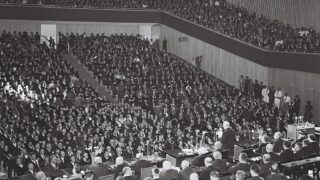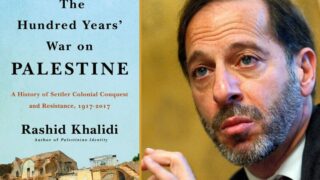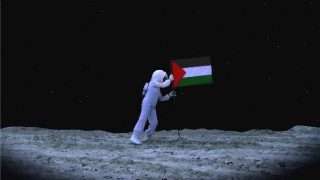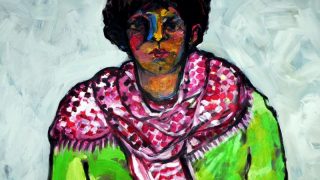Settler colonialism, like other forms of domination, divides as it conquers. The further it penetrates into a territory it has appropriated, the deeper it manages a people it has subjugated, the more it partitions, segments, and breaks apart. In Israel/Palestine, this fragmentation is most visible in the landscape of the so-called future Palestinian state where settler roads and apartheid walls strangle autonomous enclaves that are themselves receding. The hundreds of checkpoints that currently divide the West Bank turn short distances into long ones, reconfiguring the nexus between time and space for an entire population.
The legal division of Palestinians is just as pernicious as its geographic fragmentation. Recently, the Israeli Knesset passed a law that recognizes Palestinian Christians living in the Israel as a separate minority, one that no longer counts as Arab. In one day, Christian Palestinian families scattered across the West Bank and the Galilee were divided by geographic borders and an administrative abyss. Not only did they possess different legal identities—West Bank Palestinian and Israeli—they now belonged to different peoples—Arab and non-Arab. They were pigeonholed into a new and arbitrary category, one amongst the many Israel has created for Palestinians: Arab Israeli, West Bank Palestinian, Palestinian from Gaza, East Jerusalemite, internally displaced, refugee… As physical and legal walls close in, one people imposes its rule and the other becomes claustrophobic. Along the way, many lose sight of the larger picture.
With the latest war on Gaza, it is not only Palestinian geography, but Palestinian chronology that has receded. It is a whole history of dispossession that was divided into shorter and separate narratives. Listen to the Israeli justifications of the war on Gaza and pay attention to their storyline. This is a war on Gaza, they say, a war on Hamas. They are the cause of the problem: the logical and chronological starting point of the war. In a recent late night talk show, for example, the French philosopher and ardent Zionist, Bernard-Henri Levy was asked why he didn’t condemn Netanyahu’s attack on Gaza and the thousands it had murdered. Levy responded that he was ready to mourn the death of Palestinian civilians, but insisted that it was Hamas that was responsible for their deaths. Perhaps this is also why he thought they were grievable. Such a response is symptomatic of a receding timeline. The Palestinians elected Hamas in 2006 therefore they should pay the price; Hamas violated a ceasefire in 2014, so they should suffer the consequences. With every argument, with every press conference, history becomes narrower, and as it shrinks, so does the framework of argumentation. Experts and commentators engage in detailed conversations about who violated what and when. Conversations hone in on the election of a “terrorist group” and specific ceasefires. As we sink into details, we lose sight of the larger history of Palestinian dispossession and the colonial policy that is at its root.
This “shrinking of history” is not new. With the initiation of the peace process in the 1990s, history suddenly contracted back to the 1967 war. The Israeli historian Ilan Pappe recognized this when he noted that the Israeli Left, which signed the Oslo Accords, “accepts criticism of post-1967 Israel,” but “the period 1882-67 is off limits.” By deciding to begin the conversation with the 1967 war, a specific diagnosis of the Palestinian predicament becomes readily available: the problem, it seems, is one nation-state illegally occupying the land of a stateless nation. Within this framework, discussions revolving around 1948, the creation of Israel, and the plight of 750 000 refugees remain “off-limits.” Notice how this fragmentation of history mirrors the division of a people. Start in 1967, and you separate Palestinians in the occupied territories from those currently under Israeli sovereignty. Begin with Hamas’ democratic election in 2006 and you separate Gaza from the West Bank. Consequently, and most disconcerting, the issues of Gaza, the West Bank, and 1948 Palestinians become disentangled. Within diplomatic circles, they branch out into different negotiation processes, each requiring its own conditions and terms of references. We get lost in details and micromanagement, while Zionist expansion grows and grows. This is perhaps what is meant by “facts on the ground”: new facts erase old ones, middles become beginnings, and origins are progressively forgotten. We no longer determine the master narrative; instead, we are slaves to its plot. We lost our right to narrate, so we fight to become characters in a play.
For Palestinians, however, these “separate” histories are one. The war on Gaza is a war on its people, an affront to its demands for rights and dignity. It is a war whose logic is at the heart of Zionism—especially in its revisionist version—rather than accidental to it. It is a repeat of the Gaza massacres of 1955, and it is directly linked to the massacre of Deir Yassin in 1948. Solidarity with Palestinian self-determination means that we should reclaim this history. As we reach back, we also reach deeper into the roots of the problem and reclaim new interpretative frameworks: settler colonialism, ethnic cleansing, and imperialism. Armed wih these interpretative tools, we reconnect the dots. The discrimination against “Arab Israelis” is no longer separate from the silent transfer of East Jerusalem, nor is it any different from the colonization of the West Bank, the plight of the 1948 refugees, or the destruction of Gaza. These are one and the same. Separating is the problem, uniting, the solution.
Translated by Assafir - Arabi






